Our live coverage is movingpublished at 00:43 GMT 2 March 2022
For technical reasons too dull to tell you about here, our live coverage of the Ukraine crisis is transferring to a new page.
Five people have died after Russia attacked a TV tower in Kyiv, hitting nearby broadcast facilities, Ukrainian officials say
It comes after Russia warned residents that it was preparing to hit targets in the Ukrainian capital
It said it was planning attacks on Kyiv technology centres, urging people to stay away
A huge convoy of Russian armoured vehicles continues to advance on the city
Freedom Square in central Kharkiv, Ukraine's second city, has been hit by a strike, killing at least 10 civilians
In its latest assessment, the Pentagon says Russian troops have not taken Kharkiv or Mariupol, but they have occupied nearby towns
UK PM Boris Johnson accuses Russia of "barbaric and indiscriminate" attacks
Edited by Jude Sheerin
For technical reasons too dull to tell you about here, our live coverage of the Ukraine crisis is transferring to a new page.
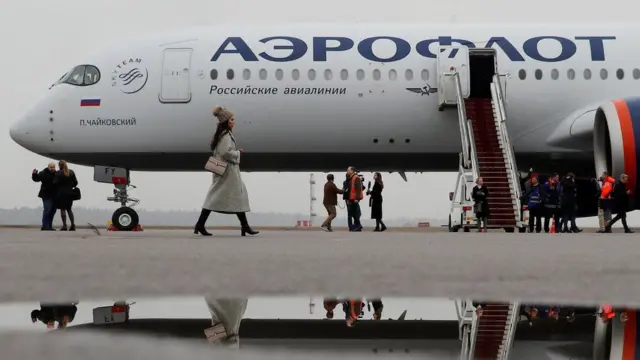 Image source, Reuters
Image source, ReutersThe BBC's US partner CBS News reports that the US will soon close its airspace to Russian aircraft.
European nations and Canada have already shut their own airspace to air traffic from Russia.
An order that bars Russian owned and operated aircraft from the US is expected within the next 24 hours.
Some flights from Russia to the US have already been cancelled.
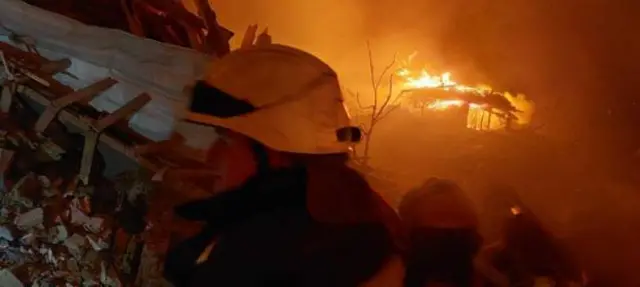 Image source, State Emergency Service
Image source, State Emergency ServiceTwo people have been killed in an air strike on the city of Zhytomyr, west of Kyiv, according to the State Emergency Service of Ukraine.
Three others were injured and more people may be trapped under rubble, the government service said.
The SES also said at least 10 homes and a local hospital were damaged in the attack.
It also released photos to show a fire broke out in some of the damaged homes.
The BBC has not independently verified these claims.
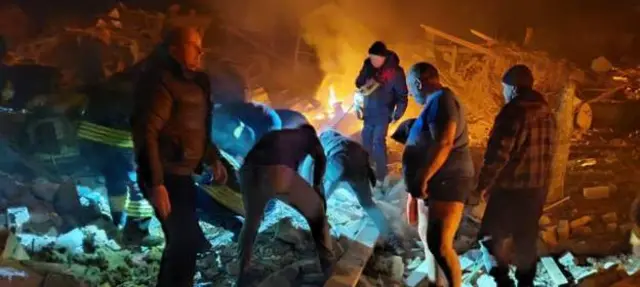 Image source, State Emergency Service
Image source, State Emergency Service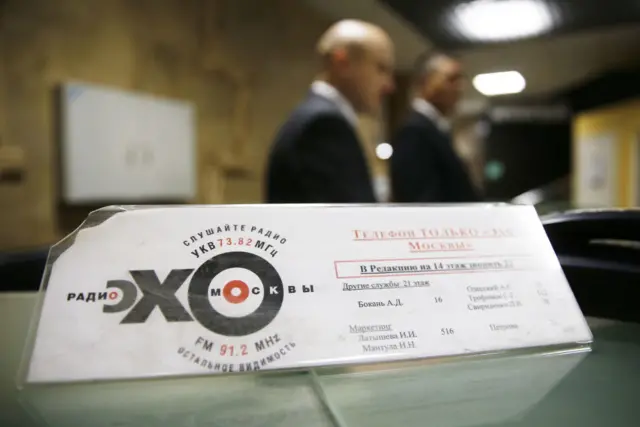 Image source, Getty Images
Image source, Getty ImagesTwo leading independent media outlets - TV Rain and the Ekho Moskvy (Echo of Moscow) radio channel - were taken off air on Tuesday night.
This follows a complaint from the Russian prosecutor general’s office that both outlets have been airing "calls to extremist activities" and "premeditated false information about Russian servicemen".
Both TV Rain and Ekho Moskvy have denied the allegations.
They remain visible and able to operate on social media and YouTube.
Separately, Russian Wikipedia said that media watchdog Roskomnadzor had issued it with a warning, demanding it remove an article entitled "Russian invasion of Ukraine 2022", or risk being blocked.
Russian authorities and the state-controlled media do not refer to the "invasion" of Ukraine or the "war", instead calling it a "military operation".
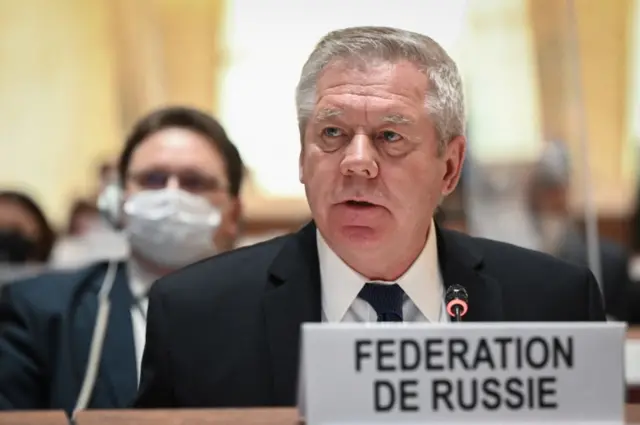 Image source, Reuters
Image source, ReutersGennady Gatilov, Russia's ambassador to the United Nations in Geneva
Moscow has seen "no desire on the part of Ukraine" to reach a legitimate and balanced solution to the problems between the two countries, says a Russian diplomat.
Gennady Gatilov, Russia's ambassador to the United Nations in Geneva, made these comments in an interview with a Lebanese TV station that aired on Tuesday.
Russia "supports diplomacy based on respect for the positions of all countries and equality, but for now we don't see that", he said, according to Russian news agency RIA.
Russia and Ukraine held peace talks on Monday, but no agreements were reached other than a commitment to meet again at an unspecified date.
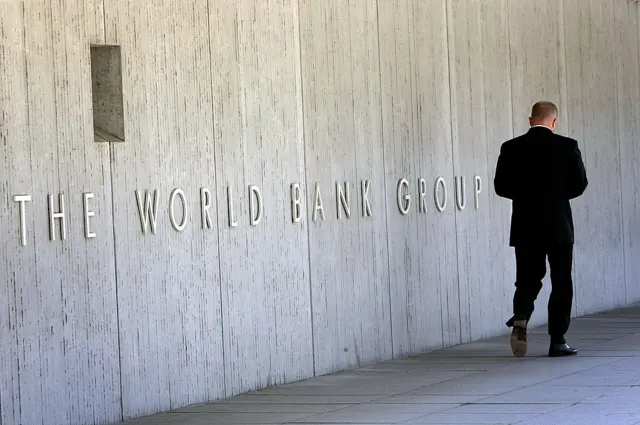 Image source, Getty Images
Image source, Getty ImagesThe World Bank Group and International Monetary Fund are preparing financing support for Ukraine.
In a joint statement, leaders of the two agencies said they were worried by the potential spillover effects of the Russian invasion.
They cited rising commodity prices, disruptions in financial markets and the risk of further fuelling global inflation.
The World Bank said it would pledge $3bn (£2.3bn) in the coming months, including at least $350m in the next week.
The IMF meanwhile said it will swiftly consider Ukraine's request for emergency financing. It also hopes to make $2.2bn in funding available up to June.
Footage has emerged of a Ukrainian crowd mobbing a Russian vehicle in the embattled eastern city of Kharkiv.
The verified footage, posted on social media, external, shows protesters hurling obscenities and attacking the vehicle with their bare fists.
Some protesters wave Ukrainian flags and others throw objects at the vehicle as it speeds away.
Ukraine: Polish communities help people fleeing war
Thousands of people fleeing Ukraine have headed to Poland. And communities across the country, particularly along the border, have rallied to help them.
The BBC went to a school that has been transformed into a shelter to speak to volunteers.
 Lyse Doucet
Lyse Doucet
Chief International Correspondent, Kyiv
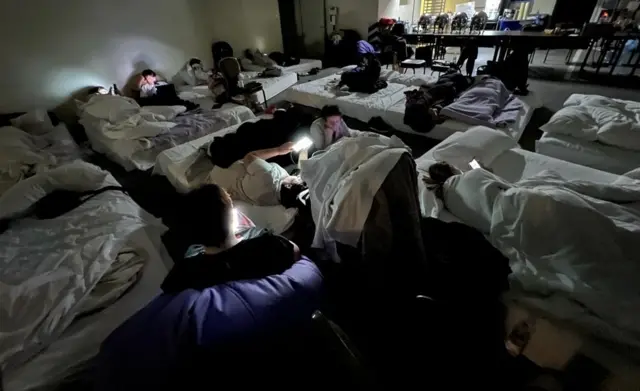
As day six of Russia’s invasion drew to a close in Kyiv, the air-raid siren sounded, five loud thuds of explosions shattered the night, and the mayor issued a warning.
“Dear friends, dear Kyivans", the champion boxer turned politician Vitali Klitschko began.
“I invite all of you to stay away from the streets and be extremely cautious. It is better to spend this night in a shelter," he said.
Many are already bedded down in basements, bunkers, and bomb shelters, glued to their phones, after an even starker warning from Russia’s Defence Ministry during the day.
The announcement dropped that Russia would strike two key security installations with “high-precision weapons”, including the Security Service of Ukraine (SBU) and the 72nd Main Centre for Information and Psychological Operations. It called on residents who live near “relay nodes” to leave their homes in an apparent reference to communication towers.
The TV tower, the tallest building in the country, did take a hit, reportedly from two missiles. Mayor Klitschko reported that experts were now working to restore the tower’s full operation.
Those missiles also slammed into the adjacent Babyn Yar Holocaust Memorial to tens of thousands of Jews murdered by the Nazis in World War Two.
“History repeating…” tweeted Ukraine’s President Volodmyr Zelensky as others mocked President Putin’s earlier call for a “de-nazification” of Ukraine.
It underscored again the fatal mistakes and misfirings in every war, this one included.
And a serpentine armoured convoy still lies in wait just 25km (15 miles) from Kyiv's city centre. Today a senior US defence official said it had advanced little – whether it was regrouping, running out of fuel and food, or facing restive troops, wasn’t clear.
The guessing game is ever-present.
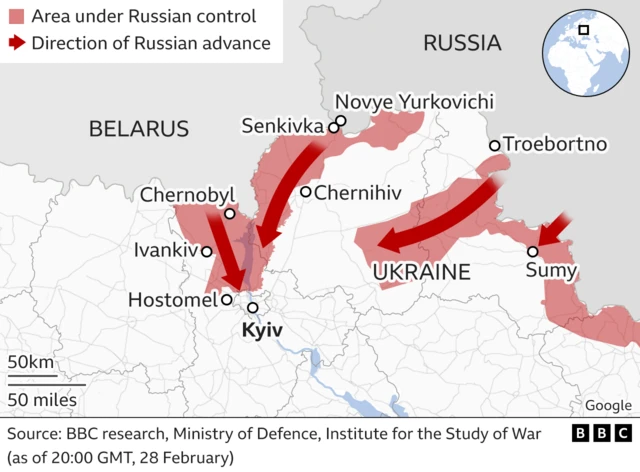
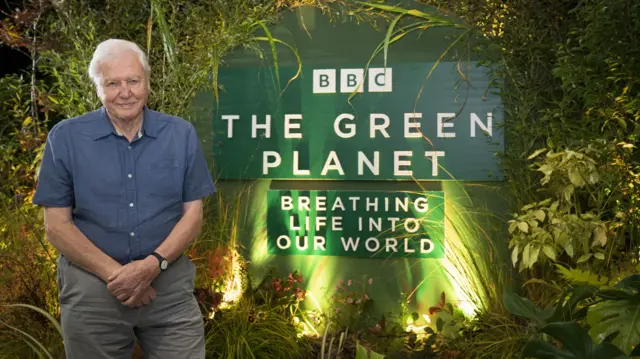 Image source, PA Media
Image source, PA MediaThe Green Planet had been sold to “Friday!” a digital channel that’s owned by Gazprom TV
The BBC has announced that it will stop licensing content to Russia.
This means the BBC will not make any new sales of programmes to Russian broadcasters - and had also made a formal request to purchasers to stop broadcasting any more episodes of series it has already licensed.
Series which will be affected include the Russian version of Strictly Come Dancing spin-off, Dancing With The Stars, and Sir David Attenborough's recent The Green Planet documentary.
ITV have done the same, saying: "We have made the decision to stop new sales to Russian clients as we do not believe it appropriate to be doing business with them at this time."
And the Producers Alliance for Cinema and TV - the UK's trade association for independent producers - has already removed all Russian production and business information from its website and is calling on its members to suspend all co-operation and trade with Russia for the time being.
Many sectors have been distancing themselves from Russia in recent days - with several major Hollywood entertainment companies pausing the release of films in Russia.
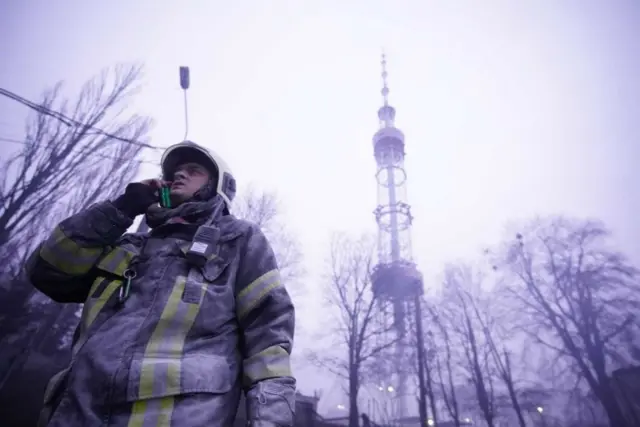 Image source, Getty Images
Image source, Getty ImagesFive people died in the attack on the tower on Tuesday
The Yad Vashem Holocaust Memorial - the museum dedicated to remembering the Nazi genocide of Jews during World War Two - has condemned the rocket attack on a TV tower in Kyiv which damaged a nearby Holocaust memorial.
The museum voiced its "vehement condemnation" to what it called a "deadly Russian attack on the vicinity of the Babyn Yar Holocaust memorial site".
A statement from Israel's foreign minister called for "the sanctity of the site to be preserved and honoured", but did not condemn Russia for the attack.
The memorial is built on Europe's largest mass grave of the Holocaust, where Nazi death squads killed more than 33,000 Jewish people in the space of just two days in 1941.
Ukraine's president described the attack near the site on Tuesday as "history repeating".
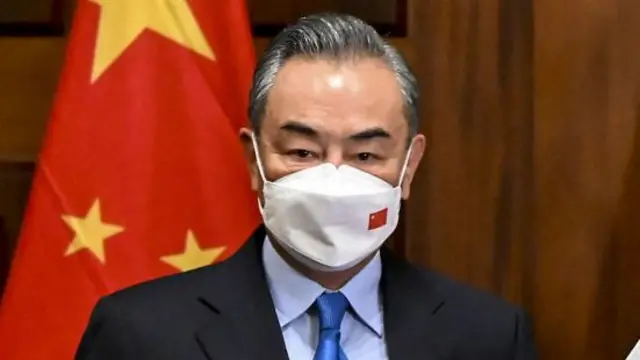 Image source, AFP
Image source, AFPPhone call follows China's abstention from a UN vote last week condemning the invasion
China's Foreign Minister Wang Yi and and his Ukrainian counterpart, Dmytro Kuleba, have discussed the conflict engulfing the eastern European nation in a call.
Wang told Kuleba he "deeply regrets" the conflict and is "paying extreme attention to the harm suffered by civilians", according to the AFP news agency quoting Chinese state media.
He also called for both sides to "find a way to resolve the issue through negotiations", the same source reported.
In the call, which marks the first between the two men since Russia's invasion on Thursday, Kuleba asked Beijing to use its ties with Moscow to help halt the invasion, the Reuters news agency said.
Wang is said to have offered to make every effort to end the violence diplomatically, the agency wrote.
Last week, defying expectation from experts, China abstained from a UN Security Council vote condemning the invasion of Ukraine.
Some analysts had expected Beijing to join Russia in voting against the motion.
Read more:
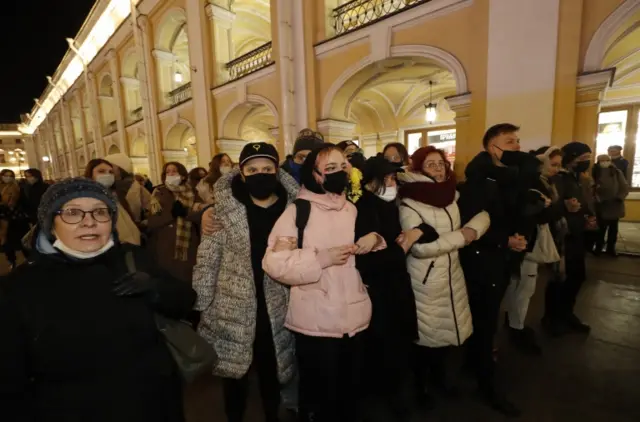 Image source, EPA
Image source, EPAProtesters chanted "no to war" in the centre of St Petersburg
More than 90 protesters were arrested in the western Russian city of St Petersburg on Tuesday while protesting against the war in Ukraine, according to the BBC Russian Service.
The protest took place at the Gostiny Dvor shopping centre on Nevsky Avenue in the city centre.
Russian police arrested the protesters, and at least one journalist, in the space of 30 minutes, our colleagues report, citing the Zaks.ru publication.
A day earlier, police in the city detained some 900 anti-war protesters.
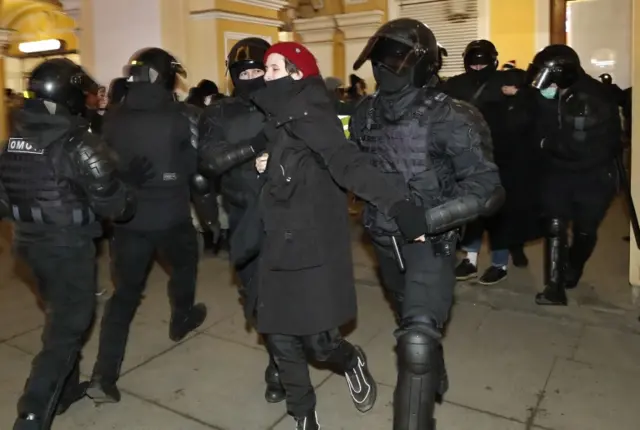 Image source, EPA
Image source, EPAMember countries of the International Energy Agency (IEA), the Paris-based intergovernmental agency that advises on oil policy, have agreed to release 60 million barrels of oil from their emergency reserves amid the Russian invasion of Ukraine.
The move comes as oil prices have risen sharply and fears of energy supply issues have emerged.
The 31 members of the IEA agreed to release reserves in order to "send a unified and strong message to global oil markets that there will be no shortfall in supplies" as a result of the Ukraine conflict, the group said.
Members include the US, UK, EU nations, Mexico, Canada, Japan and others.
"Today’s announcement is another example of partners around the world condemning Russia’s unprovoked and unjustified invasion of Ukraine," the White House said, adding that efforts to get away from Russian energy supplies continued.
Earlier this week, oil giants Shell and BP said they would off-load stakes in Russian energy companies and stop projects.
 Image source, Constantinis/Getty Images
Image source, Constantinis/Getty ImagesIf you woke up this morning, looked at the news, and felt increasingly worried about the war in Ukraine, you are not alone. After a two-year pandemic, it's a lot to absorb, and experts agree that feeling overwhelmed is normal.
While it's right to think first and foremost about the impact on those caught up in the conflict, it's also completely normal to feel upset from afar by what we're seeing in Ukraine, says Alex Bushill, from the mental health charity Mind.
"It's very natural to be distressed by what we're seeing, you wouldn't be human if you didn't," he says.
This doesn't always lead to anxiety, but the NHS and Anxiety UK agree on some key ways to avoid it: eat well, get outside, put your phone down, connect with people, rest.
These are all pretty basic pieces of advice, but when you're stressed, they can be difficult to do consistently.
We've news of more action being taken by Apple. The tech giant has paused sales of its products in Russia, the company has announced.
The company has also limited its payments system, Apple Pay, and other services including live-traffic tracking, according to the Reuters news agency.
The BBC's Ukrainian service reports that consumers in Russia attempting to buy an iPhone, watch or MacBook on the company's website are greeted with a message saying that delivery of the goods is impossible.
The move by Apple comes after Ukrainian Vice Prime Minister Mykhailo Fedorov disclosed earlier this week that he had sent a letter to the company's chairman Tim Cook asking that Apple be blocked from Russia.
Allow X content?
This article contains content provided by X. We ask for your permission before anything is loaded, as they may be using cookies and other technologies. You may want to read X’s cookie policy, external and privacy policy, external before accepting. To view this content choose ‘accept and continue’.
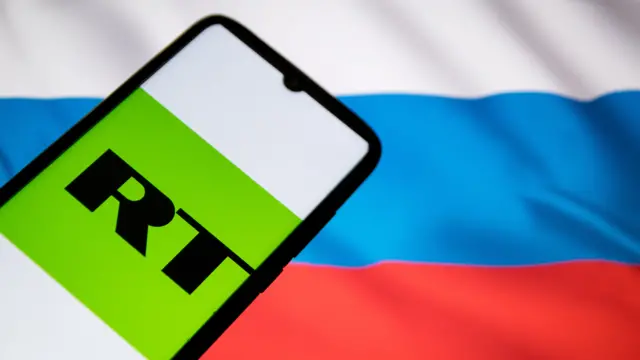 Image source, Getty Images
Image source, Getty ImagesGoogle has removed the Russian state media outlet RT from its news search tool.
"In this extraordinary crisis we are taking extraordinary measures to stop the spread of misinformation and disrupt disinformation campaigns online," Kent Walker, Google's president of global affairs said.
The company already had restricted Russian government-funded news sites from advertising and using some features on YouTube, the video-sharing platform owned by Google.
RT's deputy editor-in-chief Anna Belkina said the move was evidence that "establishment" Western companies are "terrified of a mere presence of any outside voice for the fear of losing their historically captive audience, if that audience encounters a different perspective".
RT and Sputnik, another government-funded site, are considered by the US State department to be two "critical elements in Russia’s disinformation and propaganda ecosystem, external".
Tech giant Apple has also said that RT and Sputnik would no longer be available for download on its app store outside Russia.
US defence officials say Russia's operation has moved much more slowly than planned, and now faces supply shortages.
The Pentagon said Russian forces had not yet taken control of Ukraine's skies after six days, nor had they taken key targets such as the country's second city, Kharkiv, or the southern port of Mariupol.
"In many cases, what we're seeing are columns that are literally out of gas," one official is quoted as saying by the AFP news agency. "Now they're starting to run out of food for their troops."
The official also said there were signs of morale problems in the Russian force, which makes use of a large number of conscript soldiers.
"Not all of them were apparently fully trained and prepared, or even aware that they were going to be sent into a combat operation.
Quote MessageWe have picked up independently on our own indications that morale is flagging in some of these units"
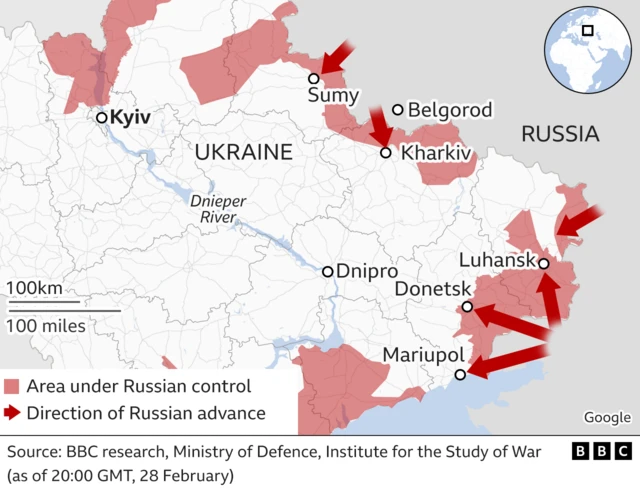
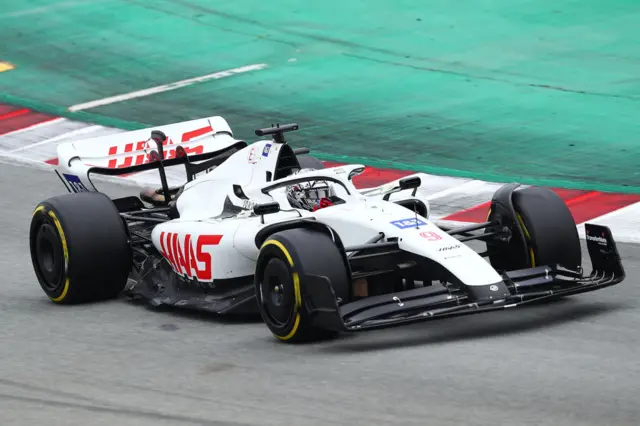 Image source, Getty Images
Image source, Getty ImagesRussian driver Nikita Mazepin can race this season with Haas
Motorsport's governing body the FIA has ruled that Russian drivers can continue to compete in global events, though not under the Russian flag.
The same will apply to Belarusian drivers due to Minsk's support for the Russian invasion of Ukraine.
The decision will allow Russian driver Nikita Mazepin to race in F1 this season with the Haas team.
Competitors from the two countries will fly a neutral banner and must make “specific commitment and adherence to the FIA’s principles of peace and political neutrality, until further notice”, the body said.
The decision follows that of the International Olympic Committee and Fifa deciding to enact an outright ban on Russian competitors.
The FIA also announced it would cancel the upcoming Intercontinental Drifting Cup event that was to be held in Sochi, Russia, this summer.
What other action has sport taken in response to Russia's invasion?
 Myroslava Petsa
Myroslava Petsa
BBC News Ukrainian
Their city has been shelled with Grad rockets, hit by cruise missiles and air bombardment.
But life goes on for the children of the Kharkiv Hippocrates centre where they treat patients with the most serious nervous system conditions.
The centre is a hospice and a rehabilitation facility. Its head, Dr Roman Marabyan, had been called up to the army, so I spoke to his deputy, Valentyna Drokina.
She seems overoptimistic for a doctor stuck with her patients in a city that’s been seeing no reprieve from Russia.
In more peaceful times, the centre used to care for dozens of young patients from the Kharkiv region and north-eastern Ukraine.
Some children were orphans - their parents abandoned them in state facilities after learning their diagnoses. The centre’s nurses and doctors have become not just children’s carers, but parental figures. Other children usually had mothers by their side.
The war has brought all of them together.
“We are one family now,” says Valentyna Drokina. Her centre welcomes all abandoned children with life-threatening conditions and those with their parents who didn’t have enough time to flee Kharkiv.
Out of 21 children that are being treated in this facility, only three can walk on their feet. Valentyna tells me the centre’s professionals had equipped its basement so that the children could spend the most dangerous hours down there.
“When it’s needed, every adult comes up to the kids, each takes one child and runs with them to the cellar," she says.
Quote Message"Children have no idea of what’s going on. They think we are playing with them"
The centre is home not just to its young patients and their parents, but also to the staff who work there. Valentyna says they even found room for three ordinary families who couldn’t find a safe place to stay.
“We are OK as long as there are no power outages.” She says the area hasn’t been shelled with Grad rockets, so they’re staying strong.
But then her voice breaks. She’s starts crying and adds:
Quote MessageMy optimism is gone"